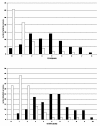Generic quality of life assessment in dementia patients: a prospective cohort study
- PMID: 20565912
- PMCID: PMC2897779
- DOI: 10.1186/1471-2377-10-48
Generic quality of life assessment in dementia patients: a prospective cohort study
Abstract
Background: Quality of life (QoL) is increasingly used to characterize the impact of disease and the efficacy of interventions.
Methods: Prospective cohort study in patients' and proxies' homes with 137 patients with dementia (age 52 to 88; Mini-Mental Status Examination (MMSE) 3 to 28) and their proxies (age 43 to 90). MMSE, Behave-AD, Geriatric Depression Scale (GDS), and Bayer-ADL scale (B-ADL), and the Euroqol (EQ-5D; patient self-rating, proxy self-rating, and proxy-rating of patient).
Results: B-ADL impairment and Behave-AD total score increased with dementia severity (Kruskal-Wallis p < 0.001 and p = 0.023, respectively). Patients' self-rated QoL and proxies' self-rated QoL were unrelated to dementia severity (p = 0.148 and p = 0.414, respectively). The difference between patients' self- and proxies'-rating of the patient's QoL correlated with the patient's MMSE (Spearman's rho = -0.434; p < 0.001), even if analysis was constrained to patients with mild AD (rho = -0.328; p = 0.019). The proxies' rating of the patients QoL was not only correlated with cognitive and behavioral symptoms of the patient but also with mood (GDS-score; rho = 0.317; p < 0.001) and cognitive abilities (verbal fluency; rho = 0.209; p < 0.018) of the proxy.
Conclusion: Proxies' assessment of the patients' QoL is related to the proxies' health, and the difference of patient's and proxie's QoL-rating is correlated with dementia severity even in mild dementia stages. QOL measures use ratings of the individual to assess the impact of symptoms and disorders on everyday life. In dementia patients, however, this impact is not captured since patients' and proxies' self-assessment of their own QoL do not reflect severity of disease whatsoever. Patients' and proxies' influencing variables render the score obtained with generic quality of life assessment meaningless in capturing the impact of dementia. Decisions on initiation or discontinuation of treatment or allocation of other resources for patients with dementia therefore need not depend on generic assessment of quality of life.
Figures


Similar articles
-
Appraising the need for care in Alzheimer's disease.BMC Psychiatry. 2013 Mar 4;13:73. doi: 10.1186/1471-244X-13-73. BMC Psychiatry. 2013. PMID: 23497052 Free PMC article.
-
Gender-dependence of substituted judgment on quality of life in patients with dementia.BMC Neurol. 2011 Sep 30;11:118. doi: 10.1186/1471-2377-11-118. BMC Neurol. 2011. PMID: 21961477 Free PMC article.
-
Factors associated with quality of life in dementia patients in long-term care.Int Psychogeriatr. 2013 Apr;25(4):577-85. doi: 10.1017/S1041610212002219. Epub 2012 Dec 20. Int Psychogeriatr. 2013. PMID: 23253469
-
[Is quality of life in dementia patients validly estimable?].Psychiatr Prax. 2007 Apr;34(3):108-16. doi: 10.1055/s-2006-952012. Psychiatr Prax. 2007. PMID: 17443451 Review. German.
-
Understanding the influence of different proxy perspectives in explaining the difference between self-rated and proxy-rated quality of life in people living with dementia: a systematic literature review and meta-analysis.Qual Life Res. 2024 Aug;33(8):2055-2066. doi: 10.1007/s11136-024-03660-w. Epub 2024 Apr 24. Qual Life Res. 2024. PMID: 38656407 Free PMC article.
Cited by
-
Exploring the views of being a proxy from the perspective of unpaid carers and paid carers: developing a proxy version of the Adult Social Care Outcomes Toolkit (ASCOT).BMC Health Serv Res. 2019 Mar 29;19(1):201. doi: 10.1186/s12913-019-4025-1. BMC Health Serv Res. 2019. PMID: 30922307 Free PMC article.
-
Appraising the need for care in Alzheimer's disease.BMC Psychiatry. 2013 Mar 4;13:73. doi: 10.1186/1471-244X-13-73. BMC Psychiatry. 2013. PMID: 23497052 Free PMC article.
-
Developing a proxy version of the Adult social care outcome toolkit (ASCOT).Health Qual Life Outcomes. 2017 May 19;15(1):108. doi: 10.1186/s12955-017-0682-0. Health Qual Life Outcomes. 2017. PMID: 28526055 Free PMC article.
-
Increased masticatory activity and quality of life in elderly persons with dementia--a longitudinal matched cluster randomized single-blind multicenter intervention study.BMC Neurol. 2013 Mar 16;13:26. doi: 10.1186/1471-2377-13-26. BMC Neurol. 2013. PMID: 23496988 Free PMC article. Clinical Trial.
-
Comparison of informal caregiver and named nurse assessment of symptoms in elderly patients dying in hospital using the palliative outcome scale.BMJ Support Palliat Care. 2019 Jun;9(2):175-182. doi: 10.1136/bmjspcare-2015-000850. Epub 2016 Jan 12. BMJ Support Palliat Care. 2019. PMID: 26758469 Free PMC article.
References
-
- Lawton MP. Quality of life in Alzheimer disease. Alzheimer Dis Assoc Disord. 1994;8(Suppl 3):138–50. 138-150. - PubMed
Publication types
MeSH terms
LinkOut - more resources
Full Text Sources
Medical

